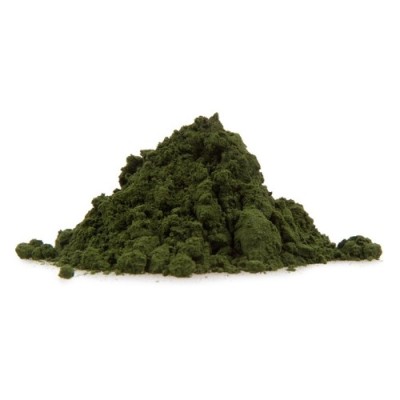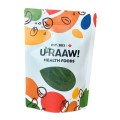Just pure, certified organic/raw freshwater spirulina cultivated in Taiwan. This powerful green-blue algae is said to be one of the most nutrient-dense foods on the planet! Adding it to your diet is a great way to boost your intake of powerful antioxidants, chlorophyll, and many trace minerals in your diet.
Features
- Contains no filler, chemicals, GMO's or other impurities
- High in iron, calcium, copper, and other important trace minerals
- 3g of highly digestible protein per 5g serving
- Sustainably & Ethically sourced
- Contains GLA (game linolenic acid) and Omega 3's
- Radiation tested
Health Benefits
Studies have shown that the nutrients and various compounds found in spirulina have significant health benefits.
Here are a few nutritional highlights and studies that stand out:
Contains GLA and Omega 3/6/9 Fatty Acids
These contribute to Spirulina's strong anti-inflammatory properties. GLA (Gama Linoleic Acid) is particularly powerful and not found in significant amounts in many foods.
What GLA does specifically:
- Helps balance omega 3/6 in body
- Maintains brain health
- Maintains skeletal health
- Aids in metabolism
- Promotes healthy skin and nails
Extremely High in Antioxidants
Spirulina contains very high levels of the antioxidant phycocyanin which has shown to boost the immune system, decrease inflammation, and fight cancerous tumors. It scores 24,000 on the ORAC (Oxygen Radical Absorbance Capacity) chart, ranking it amongst the top 20 foods on the planet in this department.
Acts as a Heavy Metal Binder
The high levels of chlorophyll are likely the reason spirulina does such a good job at binding with heavy metals in the body. This study had some astonishing results that decreased levels of arsenic by 50% in the body when combined with the mineral zinc.
Aids in Balancing Blood Sugar
In this study, diabetics were given 2 grams of spirulina daily for 60 days. At the end of the study, all participants showed significant reductions in blood sugar levels.
Decreases Inflammation
Multiple studies have shown that spirulina decreases inflammation in the body thanks to high amounts of phycocyanin. This compound is what gives spirulina its intense green/blue hue.
May Help Regulate Blood Pressure
This study conducted in November of 2007 showed promising 'hypolipemic' effects. Participants that were given 4.5 grams of spirulina powder per day not only had decreased blood pressure but also improvement in a number of blood plasma markers.
The study concluded the following:
"We propose that because of these pharmacological properties, Spirulina could be used as a dietary supplement on dyslipidemic and hypertensive patients."
Spirulina FAQ
What is it Spirulina?
A green-blue freshwater algae--a close relative to Chlorella.
How much should I consume daily?
Anywhere from 1-8 grams (or higher), depending on your goals.
Is it a good source of Protein?
Yes--spirulina contains 65% protein and is considered a complete protein (contains all essential amino acids)
What nutrients are found in spirulina?
Vitamins A, C, D, and E, as well as B vitamins B1(thiamine), B2 (riboflavin), B3(nicotinamide), B6 (pyridoxine), B9 (folic acid). It also contains trace minerals including potassium, calcium, chromium, copper, iron, magnesium, manganese, phosphorus, selenium, sodium and zinc.
What is the difference between spirulina and chlorella?
They are both nutrition algae but are structurally different. Spirulina is more nutrient-dense but contains lower amounts of chloryphyll.
| Product Details | |
| Ingredients | *Spirulina (Arthrospira platensis) (*=Organic) |
| Allergens | Packaged in the same facility as tree nuts, peanuts. |
| Country of Origin | Taiwan |
| Size | 227g |

